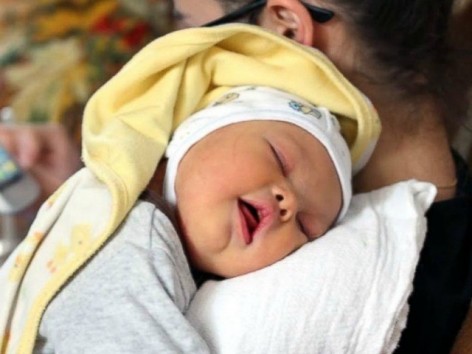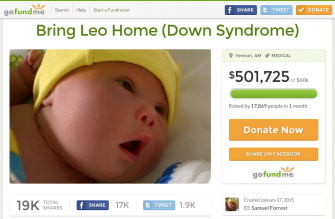Armenian Story Shows We Must Stay Vigilant
in the pursuit of human rights for people with Down syndrome. Even where there are anti-discrimination laws, they aren’t always followed.
 In the recent case of “Baby Leo,” the birth of one child with Down syndrome in Armenia has sparked a worldwide discussion about the rights of the differently-abled, government policies regarding communication with new parents, and the need for improved education and awareness.
In the recent case of “Baby Leo,” the birth of one child with Down syndrome in Armenia has sparked a worldwide discussion about the rights of the differently-abled, government policies regarding communication with new parents, and the need for improved education and awareness.
Leo was born Jan. 21, 2015, to an Armenian mother and a father from New Zealand. Leo’s father claimed that the baby was abandoned by his mother and he was given an ultimatum of divorce if he wanted to keep the child. She filed for divorce a week later after the father decided to keep Leo. Leo’s mother has disputed that account, and recent news reports state that the couple may be reconciling and planning to move together to New Zealand.
Regardless of the circumstances, Global knows that new parents of a child with Down syndrome can be overwhelmed by the experience and must receive fair, accurate and complete information about what it means to have a child with Down syndrome in the 21st century, when life expectancy has dramatically increased and medical advances are improving the quality of life. Such information is available through the Down Syndrome Prenatal Testing Pamphlet, a joint project of Global and the National Down Syndrome Congress that is available for free as a digital download or as a printed pamphlet upon request.
Unfortunately, it seems that complete and accurate information wasn’t readily available in the case of Baby Leo in Armenia, where societal norms often favor orphanages over a familial setting for those with Down syndrome because of a lack of government assistance to families of the differently-abled.
Leo’s father, Samuel Forrest, created the “Bring Leo Home” fundraising page on website GoFundMe to try to get donations of $60,000 to return with Leo to his native New Zealand, where he believes social services and more widespread acceptance of the differently-abled would provide for a better life. After Leo’s story went viral, Forrest ended up raising over $500,000 from nearly 18,000 donations on the site.
 Forrest’s “Bring Leo Home” page describes Armenia as a country renowned for its hospitality, but where “scores of babies are abandoned each year, for reasons ranging from physical or intellectual disabilities and minor ‘imperfections.’ ”
Forrest’s “Bring Leo Home” page describes Armenia as a country renowned for its hospitality, but where “scores of babies are abandoned each year, for reasons ranging from physical or intellectual disabilities and minor ‘imperfections.’ ”
In a Facebook post, Leo’s mother, Ruzan Badalyan, said she was concerned about raising a child with Down syndrome in Armenia: “The first thing that came to my mind after the diagnosis was that I don’t want my child to live in a country where certain stereotypes dominate the lives of people with DS.”
In reality, Armenia has laws in place to prevent discrimination against people who are differently-abled, but those laws aren’t always enforced or haven’t had the desired effect on changing societal attitudes. Armenia has signed and ratified all the basic human rights protocols of the United Nations, including the Convention on the Rights of Persons with Disabilities, and has enacted its own national policy with specific protocols for the elimination of discrimination and protection of children who are differently-abled. But just because such laws are in place doesn’t ensure their enforcement or the availability of enough resources to make sure the differently-abled are afforded the same opportunities as their typical peers.
In 2005, Armenia developed an Inclusive Education program aimed at improving specialized schools and bringing more children who are differently-abled into “mainstream” schools. However, statistics show that out of 6,800 school-age children who are identified differently-abled, only about 4,500 attend schools.
Children with Down syndrome deserve the same basic human rights as any other child regardless of what culture they are born into, especially the right to live a life free of discrimination and bigotry. It’s not just parents in countries like Armenia where help is needed in the pursuit of these rights. Even in the United States, where awareness of Down syndrome and acceptance of the differently-abled are considered important ideals, Down syndrome remains one of the least-funded genetic conditions by the National Institutes of Health, despite being the most frequently occurring chromosomal condition.
The more than $500,000 raised for Baby Leo shows that people understand that families need more resources to raise a child with Down syndrome. Forrest has said that “We will use some of the money you’ve given to fund facilities and programs here in Armenia that will support future parents to keep their kids despite all disabilities, and to help better care for the special ones who end up away from their Mum and Dad.”
Increased awareness can lead to action, and those actions can lead to further research and education that will improve the lives of all people with Down syndrome. Accordingly, Global is committed to basic research at the Linda Crnic Institute for Down Syndrome, and clinical research at the Anna and John J. Sie Center for Down Syndrome, and to providing research and educational grants both domestically and internationally.
Support Global’s research, medical care, education and advocacy efforts by donating today, and help make the future brighter for all people with Down syndrome, whether born in Armenia, the U.S. or anywhere around the world.
Recent Posts
- GLOBAL LEADERS – An Exclusive Interview with Erin Suelmann, Executive Director of the Down Syndrome Association of Greater St. Louis
- Sleep Apnea Across the Lifespan in People with Down Syndrome
- Government Profiles: Robert Aderholt (R-AL) & Tammy Baldwin (D-WI)
- Connor Long & Josh Peck: A GLOBAL Bromance
- GLOBAL Launches Pilot Fitness Program using Mann Method PT

 Experience our inspirational and groundbreaking videos and photos. Our children and self-advocates are beautiful AND brilliant!
Experience our inspirational and groundbreaking videos and photos. Our children and self-advocates are beautiful AND brilliant! Make sure your local Representatives are on the Congressional Down Syndrome Task Force.
Make sure your local Representatives are on the Congressional Down Syndrome Task Force.